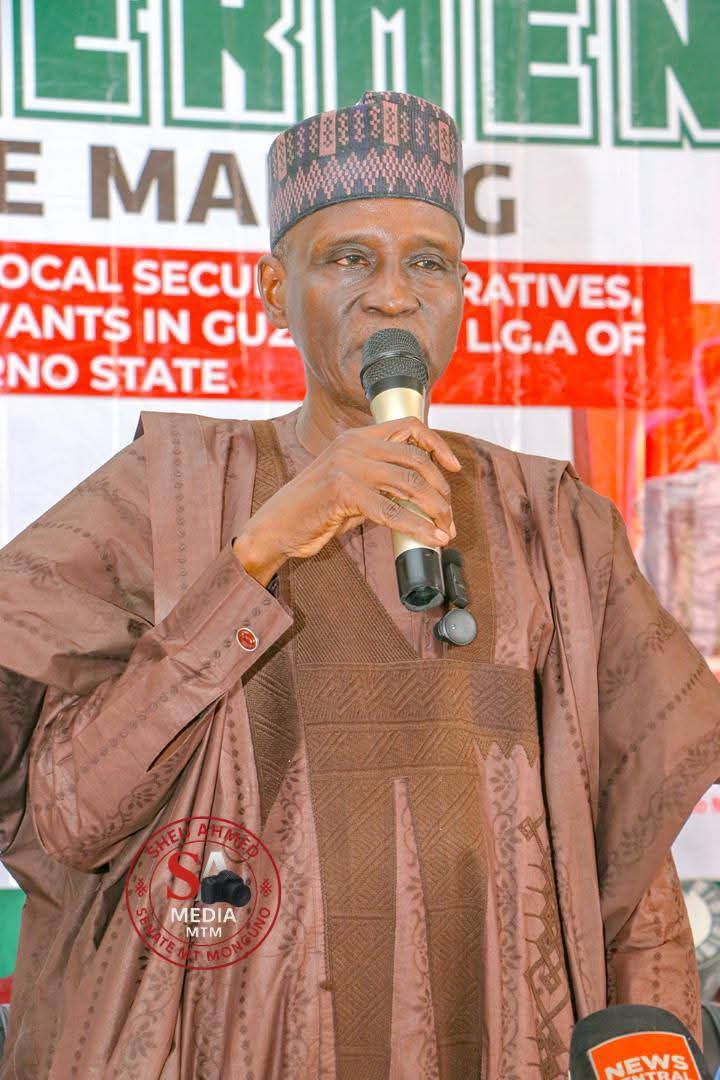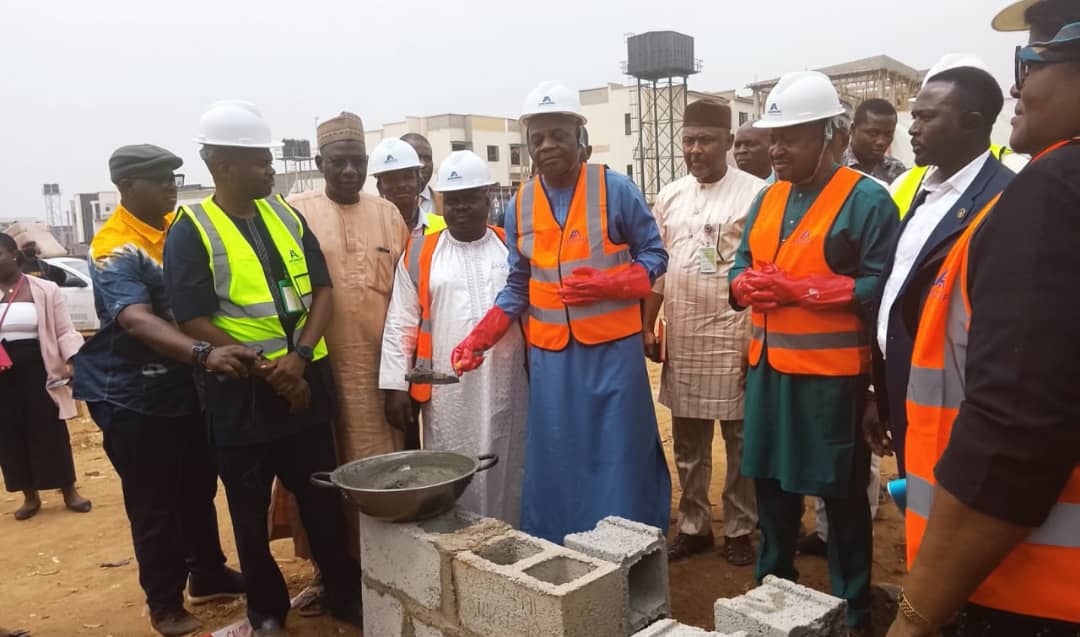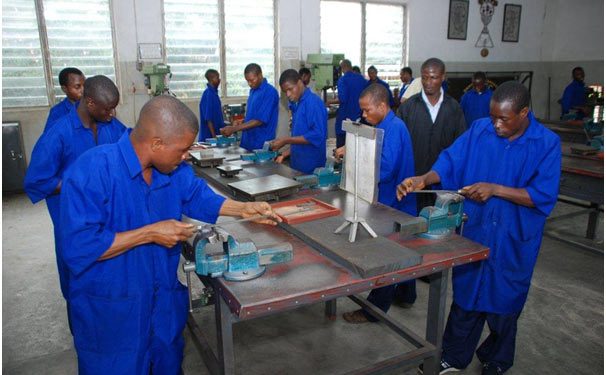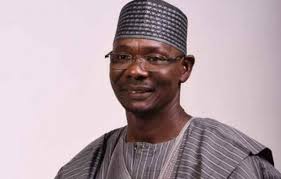News
Nigeria gets Artificial Intelligence, Robotics Centre

Dr Isa Pantami, Minister of Communications and Digital Economy, on Friday in Abuja, inaugurated the National Centre for Artificial Intelligence and Robotics.
The centre seeks to position the country for the Fourth Industrial Revolution that dwells on emerging technologies.
The minister said at the inauguration that the establishment of the centre was in line with the eight pillars of the National Digital Economy Policy and Strategy (NDEPS) of the Federal Government.
He explained that the centre related to the seventh pillar of NDEPS, which is on Digital Society and Emerging Technologies.
Pantami said also that emerging technologies included Artificial Intelligence, Internet of Things, Robotics, Cyber security, Virtual Reality and Augmented Reality, Block chain, Big Data Analytics and Cloud Computing, among others.
“Artificial Intelligence is the refinery of the digital economy and Robotics is very useful in supporting companies as they carry out repetitive tasks.
“These are two very important emerging technologies that will shape the face of future technologies and we have decided to be proactive to enable us to play a key role in how these technologies evolve.
“The Fourth Industrial Revolution, fuelled by Big Data, propelled by robust computing capacity, advanced software and Artificial Intelligence is ushering new ways of living, well-being, learning, travelling and working.
“Its innovative use-cases are quickly changing lives for the better and creating new types of jobs,’’ Pantami said.
Other pillars that reflected the vision of the centre, he said, were the third, fifth and eighth which focused on solid infrastructure, digital services development and promotion, indigenous content development and adoption respectively.
Pantami said, according to PricewaterhouseCoopers (PwC), Artificial Intelligence would have huge impact on healthcare, automotive, financial services, retail and consumer, technology, communications and entertainment, manufacturing, energy, transport and logistics.
According to him, all these translate into a significant global economic impact as cited by several sources and Nigeria must not be left out, hence, the call for immediate action.
“It is predicted that by 2025, Artificial Intelligence will be a 190-billion-dollars business as 83 per cent of companies are also reported to state that it is their strategic priority for the future.
“Artificial Intelligence has a significant impact in all sectors and has played a very important role in the fight against COVID-19.
“There are 12 million robotic units worldwide in 2020 and this is expected to increase by 12 per cent by 2022,’’ he said.
He, however, disagreed that the use of robotics could lead to loss of jobs and said that reports showed that deploying robotics led to the employment of about 150,000 people globally in engineering and assembly jobs.
He also said there were already existing regulations such as the Nigerian Data Protection Regulation, the National Broadband Plan, the National Digital Innovation and Entrepreneurship Policy, among others to drive the activities of the centre.
Pantami said the centre would serve as a leading hub of innovation, research and development, knowledge transfer, and training in the areas of Artificial Intelligence, Robotics and other emerging technologies.
“This centre will also serve the purpose of creating a vision for Artificial Intelligence in the country, identifying Artificial Intelligence-driven use-cases; support data stewardship and develop an Artificial Intelligence ecosystem, among others.
He said it was equipped with a digital innovation laboratory, Maker Space and Fabrication laboratory, Printed Circuit Board Facilities, 3-D Printer, Co-working space for ICT start-ups and training facilities.
He added that the centre would house the Massachusetts Institute of Technology Regional Entrepreneurship Acceleration Programme (MIT-REAP) office set to translate research insights into practical frameworks.
The U.S.A.-based Massachusetts Institute of Technology is a cutting edge institute globally renowned for science and technology feats.
Pantami also expressed the hope that the centre would engage Nigerian youths, support economic diversification, create jobs and inspire digital entrepreneurship.
He directed the National Information Development Agency (NITDA to file a monthly report on the activities of the centre till Dec. 2021 when it could be certified to perform independently.
He called on the Ministry of Science and Technology for synergy in ensuring that the centre could be fully utilised to achieve the digital economy agenda of the Nigerian government.
“I hereby challenge our innovators to utilise the centre and come up with revolutionary solutions to our local and global challenges.
“We must move away from being consumers to producers because we have the potential and government is fully committed to supporting you,’’ he said.
At the inauguration, the Director-General of NITDA, Mr Kashifu Inuwa, explained Artificial Intelligence as the ability of machines to mimic human thinking and behaviour, which could be applied to the project of developing systems with human characteristics.
He also said that robotics was the engineering discipline that dealt with the design, construction, and operation of robots, which complements human labour.
“This project is one among many of our developmental programmes in accordance with NITDA’s core mandate of facilitating the growth of Information Communication Technology development in Nigeria.
“We are focused on providing support for viable innovations with socio-economic impact as well as a level playing field for all Nigerians to thrive in.
“As we enter the age of advanced technological breakthroughs such as Artificial Intelligence (AI), Nigeria cannot be left out in harnessing the advantages of AI, robotics and other emerging technologies,’’ he said.
He recalled the McKinsey Global Institute (MGI) report which said that AI had the potential to add to economic growth but the impact may be gradual and take sometimes to manifest.
U.S.-based MGI helps leaders in the commercial, public, and social sectors to develop deeper understanding of the evolution of the global economy and to provide a fact base that contributes to decision making on critical management and policy issues.
Inuwa said the report projected that while developed countries could add 20 per cent to 25 per cent net income to their Gross Domestic Product (GDP), using AI, developing countries such as Nigeria could add 5 per cent to 15 per cent by deploying same.
He said that the country’s GDP now stood at around 400 billion dollars, while AI technology could increase it by between 20 billion dollars and 60 billion dollars in 10 years.
According to him, the centre inaugurated on Friday aims at achieving such unprecedented boost to the nation’s economy.
He also said that the technology as predicted by World Economic Forum could create nearly 60 million jobs.
He observed that AI and robotics were used across the globe in the care of COVID-19 patients and would be more relevant in ensuring that the spread of the virus was curtailed.
“Be abreast with technological advancement or be left behind,’’ Inuwa quipped.
He urged stakeholders to put the facility to optimum use to project the gains of AI and robotics in the Nigerian technological space.
Mr Musa Bello, Minister of FCT, commended the transformation of the ICT sector by Pantami, adding that he was laying the foundation for digital growth of the country.
According to Bello, this is the first centre of this nature owned by government and it opens up a space for the wider development of other sectors of the society.
Mr Mohammed Abdullahi, Minister for State, Science and Technology, congratulated the agency and pledged to support it for the growth of governance.
News
Audi: Trajectory of Success and Changing the Narrative

From a plethora of achievements and milestones—despite daunting challenges and shortcomings—the foresight, vision, and focused leadership of the present administration have transformed and repositioned the Service like never before in its history. In spite of limited funding and other grey areas yet to be addressed, the leadership has successfully turned around the narrative through deliberate rebranding efforts since assuming office.
Staff welfare remains paramount to the Commandant-General, who has consistently prioritized boosting esprit de corps and high personnel morale through the prompt payment of salaries, allowances, and other official entitlements as and when due. The leadership has also entrenched core values of integrity, intelligence-based security response systems, and professionalism across all operations. These measures have significantly reduced the activities of criminals, vandals, kidnappers, herdsmen, and illegal miners across the country.
In a press release signed by Mahmud Bello, Director of Media and Stakeholders Engagement of the Citizen Watch Advocacy Initiative (CWAI) in Kaduna State, the organization stated that the paramilitary agency has demonstrated genuine commitment to the interest of Nigerians through its open-door policy and robust engagement with its various publics. This approach has greatly reduced threats and disaster incidences nationwide through professional intelligence gathering, investigation, information sharing, manpower development, and strong collaboration with sister agencies—leading to remarkable improvement in disaster management as first responders.
Accordingly, transparency, accountability, and good governance have remained at the forefront of the present administration’s transformational philosophy. This has resulted in far-reaching reforms, including the regulation of private security companies, the introduction of Mining Marshals to secure strategic mining sites nationwide, containment of vandalism of critical national assets, reduction of oil theft in the Niger Delta region, and the assumption of VIP protocol protection responsibilities. These achievements surpass those of previous administrations and mark a significant milestone in the Service’s evolution.
CWAI authoritatively confirmed that the present management has introduced comprehensive institutional reforms that have repositioned the Service for greater productivity, efficiency, and effectiveness in delivering its mandate of safeguarding lives, property, and critical national assets—thereby reducing criminal activities and enhancing national security.
The Commandant-General, Professor Abubakar Ahmad Audi, reiterated that the reforms introduced align with his vision to upgrade the operational machinery of the Corps. He noted that the reorganization and revitalization of the training department are aimed at sharpening the skills and competencies of personnel to effectively address contemporary security challenges posed by hoodlums, bandits, kidnappers, and insurgents.
The establishment of the Mining Marshals and the Special Female Squad (SFS) are novel initiatives and the first of their kind in the history of the Corps. In response to the Federal Government’s Safe Schools Initiative, the NSCDC conducted audits and surveys of schools nationwide and developed a framework for proactive security measures to address the persistent attacks on educational institutions. These squads, like the Mining Marshals, are strengthening partnerships with local communities and stakeholders while prioritizing surveillance and monitoring to curb violent attacks and criminal activities.
The statement further emphasized that the Directorate of Legal Services has been reinvigorated and strengthened with enhanced prosecutorial competence, improving law enforcement and accountability. Similarly, the Anti-Vandal Unit has undergone major reforms and has been strategically deployed across the South-South geopolitical zone to curb pipeline vandalism, crude oil theft, and destruction of critical national assets. Over 2,500 suspects have been arrested since the beginning of the year for offences ranging from vandalism and attacks on national infrastructure to cattle rustling, banditry, attacks on farmers and farmlands, and illegal mining.
The Commandant-General attributed these successes to effective inter-agency collaboration, synergy, and partnerships, calling for comprehensive manpower development within the national security architecture.
Sports have also received significant attention under the present leadership, with officers and men of the NSCDC winning numerous laurels and trophies in various sporting engagements. All personnel, regardless of rank, have been provided with insurance cover against accidents, disability, or death in the course of duty. The Commandant-General views sports as a unifying platform that promotes wellness, camaraderie, information sharing, and mutual trust among paramilitary agencies.
CWAI further noted that the crackdown on illegal mining activities has saved the economy substantial revenue losses, while the destruction of over 450 illegal refineries has reduced oil theft. Additionally, the arrest of suspects and recovery of critical assets and railway materials valued at over ₦5 billion represent major milestones of the Service.
The organization therefore endorsed the change mantra of the Audi-led management and expressed confidence in the present leadership, noting that Nigerians are proud of its achievements despite prevailing challenges.
CWAI urged personnel to remain good ambassadors of the Corps—incorruptible and aligned with international best security practices wherever they serve. Nigerians were also encouraged to support the management in strengthening efforts against vandals and criminals nationwide.
The organization appealed to corporate bodies and public-spirited individuals to support President Bola Ahmed Tinubu’s Renewed Hope Agenda, particularly efforts to modernize the NSCDC through funding, partnerships, manpower development, capacity building, and the acquisition of modern security equipment.
Finally, CWAI emphasised the need for increased national budgetary allocation to the NSCDC in view of its critical role in the nation’s security architecture, including its added responsibility of VIP protocol protection. It also called for the entrenchment of a standard training curriculum to enhance career progression, effective supervision, and transparent regulation of Private Guard Companies across the country.
News
Senator Monguno Launches ₦250 Million Mega Empowerment Programme for 2,500 Constituents

The Senator representing Borno North Senatorial District, Chief Whip of the Senate and Vice Chairman of the Senate Committee on Appropriation, Distinguished Senator Mohammed Tahir Monguno, has unveiled a ₦250 million Mega Empowerment Programme designed to strengthen grassroots economic development through skills acquisition and financial support. The initiative, targeting 2,500 constituents, commenced with the disbursement of ₦125 million to 1,250 beneficiaries in the first batch, each receiving ₦100,000 as start-up capital. The second batch of 1,250 beneficiaries is scheduled to receive the remaining ₦125 million next week, ensuring equitable coverage across the constituency. Ahead of the disbursement, participants underwent a four-day intensive training in Tie and Dye, Cake Making, Tailoring, Entrepreneurship, Soap Making, Groundnut Cake Production, and Hairdressing. The programme deliberately focused on youths and women, equipping them with practical skills to foster self-reliance, productivity, and sustainable livelihoods. Prominent stakeholders, including Alhaji Kallah Maina Monguno, Hon. Mohammed (M-Gas), and APC Local Government Chairmen, commended Senator Monguno’s people-focused leadership. They described the initiative as timely and impactful, urging beneficiaries to apply the support responsibly as a strategic investment in human capital development. Speaking on behalf of the organisers, Mr. Suleiman reaffirmed their commitment to transparency and sustainability, advising participants to remain disciplined and dedicated to their chosen trades. The event drew wide attendance from political leaders, religious figures, and youth and women group representatives, underscoring its significance. Senator Monguno emphasized that the programme is not a one-off intervention but a long-term strategy to strengthen skills acquisition, promote entrepreneurship, and create sustainable sources of livelihood. He noted that the initiative complements Governor Babagana Zulum’s human capital development agenda and aligns with the broader vision of reducing unemployment and fostering inclusive economic growth in Borno State.
News
TETFund Begins Construction of Abuja Leadership Centre

The Tertiary Education Trust Fund (TETFund) has initiated the construction of the Abuja Leadership Centre of Excellence in Public Governance at Yakubu Gowon University, formerly known as the University of Abuja.
The Executive Secretary of TETFund, Sonny Echono, officially launched the project alongside the Vice-Chancellor of the University of Abuja, Professor Hakeem Babatunde Fawehinmi, and the Director of the Centre, Professor Philip Dahida, during a ceremony held on Tuesday in Jahi, Abuja.
During the event, Echono emphasized the goal of making the Abuja Leadership Centre “a stopping point for every leader visiting the country.” He described leadership as a crucial element of national development, noting that the success or failure of nations often hinges on the quality of leadership they cultivate.
He highlighted that effective leadership relies on a collective effort to utilize intellectual, human, and material resources, which, when efficiently coordinated, can drive national development aspirations.
Echono disclosed that TETFund plans to commission approximately 467 projects across tertiary institutions nationwide between now and October. “It is my prayer and hope that this centre will become a stopping point for every leader visiting our country. Its location in the nation’s capital is not accidental,” he remarked.
The TETFund boss expressed optimism that the Abuja Leadership Centre would develop into a world-class facility capable of nurturing leaders across various sectors of the economy and hosting globally recognized speeches, conventions, and declarations.
The TETFund Executive Secretary urged the contractors responsible for the project to meet expectations, emphasizing that the goal is to create a facility of international standard. He assured that TETFund would provide funding not only for construction but also for high-quality furniture and equipment.
According to him, the Centre is envisioned as more than just a conference hall or auditorium; it aims to be a top-tier leadership facility where visiting heads of state and their delegations will feel at home, comparable to similar facilities worldwide.
Echono praised the leadership of the University of Abuja and the Centre for the stability and direction they have brought to the institution, reaffirming TETFund’s commitment to collaborating in order to realize the vision of the university’s founders. He emphasized that, by its name and mandate, the university must continue to promote national unity, integration, and excellence, particularly in leadership and governance.
Regarding the commissioning of projects, he noted that it would not be feasible for the agency to inaugurate all projects directly, but at least 50 iconic projects would be selected across the states, with a minimum of two to three in each state.
Earlier, in his remarks, Vice-Chancellor Professor Fawehinmi stated that the groundbreaking ceremony marks a new phase in the university’s collaboration with TETFund. He noted that the Abuja Leadership Centre would function as a center of excellence for public governance and leadership, serving as a national hub for training future leaders who will significantly impact policy formulation and national development.
The Vice-Chancellor commended Echono’s leadership at TETFund, pointing out that under his guidance, the agency has transformed tertiary education not only through physical infrastructure but also in staff development, libraries, and other essential facilities.
He expressed confidence that TETFund would ensure the timely completion and proper furnishing of the Abuja Leadership Centre so that it can be fully utilized to achieve its objectives. Fawehinmi assured that the university would maximize the use of the facility, describing the project as a historic intervention that would be remembered for years to come.
“Today, we further strengthen our long-standing partnership, and we are delighted to announce that this Abuja Leadership Centre will be a center of excellence for public governance and leadership. It will serve as a national hub for training future leaders who will be involved in policy decisions for the development of their country. We extend our gratitude to you and your team, as we recognize the importance of nurturing our relationship into the future. Executive Secretary, you have done exceptionally well over the years. You have led one of the most impactful intervention agencies for tertiary education in the country, and we are very proud of your achievements,” he added.
The Director of the Abuja Leadership Centre, Professor Dahida, praised TETFund for commencing the construction of its permanent site, stating that the development signifies the realization of a vision rooted in the belief that leadership is the most vital resource for good governance, institutional excellence, and national development.
Dahida revealed that the Centre was established to serve as a hub for thought leadership, capacity development, policy dialogue, and ethical reorientation, not only for the University of Abuja but for Nigeria and the wider African region. Adding that the Centre is also designed to bridge the gap between theory and practice, academia and policy, and leadership ideals with real-world application.
He charged the contractor to execute the project strictly in line with the approved specifications, timelines, and agreed standards. Stressing that the facility must reflect world-class quality, professionalism, and durability, while public funds entrusted to this project must translate into tangible value, accountability, and excellence.
“Today marks far more than the commencement of a construction project. It signifies the physical birth of a vision, one rooted in the conviction that leadership is the most critical resource for good governance, institutional excellence, and national development.
“The Abuja Leadership Centre, TETFund Centre of excellence, was established to serve as a hub for thought leadership, capacity development, policy dialogue, and ethical reorientation, not only for the University of Abuja but for Nigeria and the wider African region.
“At a time when nations are confronted with complex governance challenges, evolving public expectations, and rapid socio-economic change, the need for principled, competent, and forward-looking leaders has never been more urgent.
“I wish to express our deepest and most sincere appreciation to the Tertiary Education Trust Fund (TETFund), and in particular to the Executive Secretary- Dr. Sunday Echono, for the approval and support that made this project possible.
“I also wish to specially commend the Vice-Chancellor of the University of Abuja, Prof. Hakeem Babatunde for his exemplary leadership, swift action, and unwavering support. From assumption of office, the Vice-Chancellor has demonstrated uncommon commitment to institutional growth and innovation.
“As we formally break ground today, I take this opportunity to enjoin the contractor to execute this project strictly in line with the approved specifications, timelines, and agreed standards. This facility must reflect world-class quality, professionalism, and durability. Public funds entrusted to this project must translate into tangible value, accountability, and excellence,” Dahida warned.
-

 Uncategorized5 years ago
Uncategorized5 years agoFG, states urged to harness flooding for ranching, others with technology – Agbaje
-

 Headlines10 years ago
Headlines10 years agoBreaking: EFCC seals Borno House of Assembly, as Hon members take to their heels
-

 News12 years ago
News12 years agoNigeria Security Operatives Stage Manhunt For Homosexual Perpetrator
-

 News9 years ago
News9 years agoHow 21-year-old Girl fled community over accusation of lesbianism
-

 News10 years ago
News10 years agoYobe Gov Moves Against Deputy
-

 Opinion7 years ago
Opinion7 years ago7 signs she has friend zoned you
-
Technology4 years ago
Online job placement company headhunts women
-

 Headlines10 years ago
Headlines10 years agoBorno Dep Gov Abducts Another Church Leader











